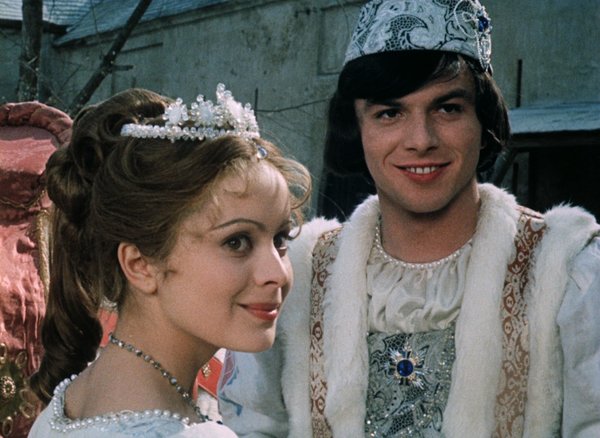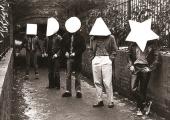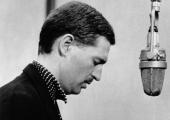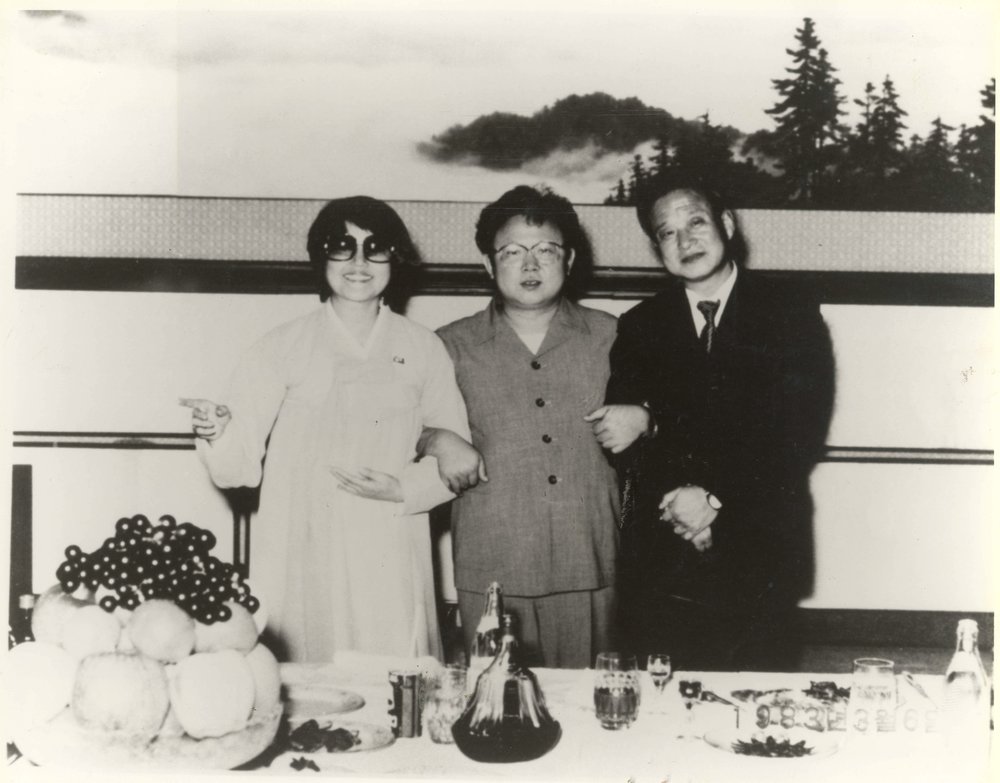Not quite three wishes; this film’s Czech title is Tři oříšky pro Popelku, which translates as three nuts. We’ll get to that later. Three Wishes for Cinderella, a Czechoslovak-East German co-production from 1973, is a treat, and still an annual Christmas fixture on Eastern European TV screens.
Director Václav Vorlíček’s source material wasn’t the familiar Cinderella retelling by Charles Perrault, but a darker version written by the 19th century Czech folklorist Božena Němcová. There’s no father, only one nasty step-sister and a refreshing lack of flashy magic. In place of a fairy godmother, heroine Popelka has three enchanted walnuts guarded by a benevolent owl, each of which contains a particular outfit to be worn when the plot demands.
Popelku’s ghastly step-mother and half-sister provide some of the giggles
Popelka, winningly played by 19-year-old Libuše Šafránková, is feisty and cheeky, more at home wielding a crossbow on horseback than she is sifting lentils from dust on the kitchen floor. As such, she’s an ideal working-class female role-model. Her confidants are the other low-grade servants and various animals, all of which play key roles as the story unfolds. Crucially, Popelka is unfazed during her first encounter with Pavel Trávníček’s Prince (pictured below right, with Šafránková), and it’s made clear that she pursues and marries him because she loves him, not just because his wealth and status offers her an escape route from domestic drudgery.
This is frequently a very funny film. Popelka's ghastly step-mother and half-sister provide some of the giggles, particularly during a brilliantly choreographed ball scene. Their fate isn’t as gruesome as the one dished out in the Grimm Brothers’ version of the story (see Sondheim’s Into the Woods), but it’s well deserved.
 And in this handsomely restored print, everything looks superb, the wintry outdoor locations gleaming thanks to an East German camera crew. Karel Svoboda’s tinkly soundtrack adds to the fun. Subtitles are easy to read, though a newly-dubbed English dialogue track would have made the film more accessible for younger viewers.
And in this handsomely restored print, everything looks superb, the wintry outdoor locations gleaming thanks to an East German camera crew. Karel Svoboda’s tinkly soundtrack adds to the fun. Subtitles are easy to read, though a newly-dubbed English dialogue track would have made the film more accessible for younger viewers.
As an extra there’s an appreciation by historian Michael Brooke, placing Three Wishes in its proper historical context and noting that the two boom periods for Czech movie fairy tales coincide with the darkest periods in the country’s post-war history. Subtexts aside, this is wonderful seasonal entertainment, a tasty antidote to today’s digitally animated bilge.
Overleaf: watch the trailer for Three Wishes for Cinderella






 And in this handsomely restored print, everything looks superb, the wintry outdoor locations gleaming thanks to an East German camera crew. Karel Svoboda’s tinkly soundtrack adds to the fun. Subtitles are easy to read, though a newly-dubbed English dialogue track would have made the film more accessible for younger viewers.
And in this handsomely restored print, everything looks superb, the wintry outdoor locations gleaming thanks to an East German camera crew. Karel Svoboda’s tinkly soundtrack adds to the fun. Subtitles are easy to read, though a newly-dubbed English dialogue track would have made the film more accessible for younger viewers.



 It’s an insane, credulity-stretching story, clearly and unfussily told. Interviewees include a spry, elderly Choi, and it’s a neat touch to have some of the more outlandish anecdotes illustrated by clips taken from Chin’s films. Choi managed to obtain a micro-cassette recorder and tape many of the pair’s conversations with the dictator – the cassettes later confirming that they had not willingly defected, as some nay-sayers on both sides of the divide later claimed. Chin’s comment that he hated “everything apart from not having to worry about money” is bitterly apposite; despite his semi-incarceration he was given unprecedented artistic and financial freedom by Kim Jong-il, a tragi-comic figure all too aware of his charisma deficit. Chin and Choi managed to play the game for several years, the pair well aware that they could be discarded in an instant should the Dear Leader fall out of love with them.
It’s an insane, credulity-stretching story, clearly and unfussily told. Interviewees include a spry, elderly Choi, and it’s a neat touch to have some of the more outlandish anecdotes illustrated by clips taken from Chin’s films. Choi managed to obtain a micro-cassette recorder and tape many of the pair’s conversations with the dictator – the cassettes later confirming that they had not willingly defected, as some nay-sayers on both sides of the divide later claimed. Chin’s comment that he hated “everything apart from not having to worry about money” is bitterly apposite; despite his semi-incarceration he was given unprecedented artistic and financial freedom by Kim Jong-il, a tragi-comic figure all too aware of his charisma deficit. Chin and Choi managed to play the game for several years, the pair well aware that they could be discarded in an instant should the Dear Leader fall out of love with them.